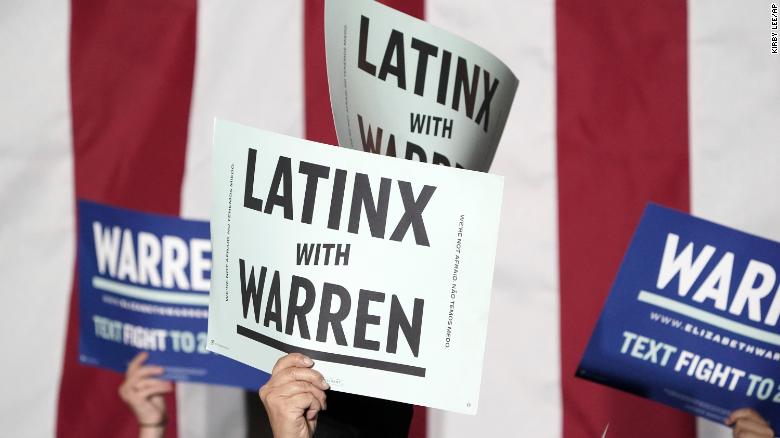(CNN) - Depending on the internet sites you frequent, you may have come across the term "latinx."
The word "Latinx" has emerged as an inclusive term to refer to people of Latin American origin or descent, encompassing those who do not identify as male or female, or who do not want to be defined by their gender. The expression has been used by journalists, politicians, corporations and universities. And in 2018 it even made it to the dictionary.
But among the people "latinx" tries to describe, few have heard the term, much less used it.
- LEE: A record number of Americans are renouncing their citizenship, according to new research. This is the reason
A new survey found that only 1 in 4 adults in the US who identify as Hispanic or Latino have heard the term "Latinx," while just 3% say they use it to describe themselves.
The findings, released Tuesday by the Pew Research Center, reveal how complex identity is for people categorized as Hispanic or Latino.
"This reflects the diversity of the nation's Hispanic population, and the US Hispanic population views itself in many different ways," Mark Lopez, Pew's director of research on global migration and demographics, told CNN. "'Latinx' is just one of those many dimensions."
"Latinx" is more common among young Hispanics
In the United States, the terms "Hispanic" and "Latino" are frequently used to refer to people of Spanish or Latin American origin.
Although often used interchangeably, "Hispanic" refers only to people from Spanish-speaking countries, which include Latin America and Spain. "Latino", meanwhile, refers to individuals with roots in Latin America, a category where Brazilians are –– Portuguese-speaking––, but which excludes Spain.
Those two terms describe a very broad group of people, and they don't always go hand in hand with how those populations identify themselves.
- MIRA: The economic crisis due to coronavirus is cruel to Latinos
Previous Pew research showed that Hispanic adults more often identify themselves by their country of origin, using terms such as Mexican, Cuban, or Salvadoran as opposed to blanket labels such as "Hispanic" or "Latino."
"Latinx" is another term that has emerged in recent years. Those who use it tend to see it largely as an inclusive term incorporating those outside the male / female binary gender.
The Pew survey interviewed more than 3,000 Hispanic adults in the US during December 2019 about their knowledge and use of the term "Latinx."
Those who used this word tended to be younger, American-born, bilingual or predominantly English-speaking, and Democratic-leaning, according to the survey findings. They were also more likely to have gone to college.
Most preferred the terms "Hispanic" or "Latino"
Searches on the term "latinx" registered a significant increase in June 2016, according to Google Trends, the same month that the shooting occurred at the Pulse nightclub in Orlando.
Since then, the word has gained popularity on the Internet, although search interest on "Latino," "Latina," and "Hispanic" over the past decade has remained much higher, the Pew Research Center researchers noted. Although online interest in "Latinx" has grown, people of Latin American descent have largely not embraced the term.
The Pew survey also asked whether participants believed that "latinx" should be used as a reference to the country's Hispanic or Latino population. Only 4% preferred that expression. About 60% said they preferred the term "Hispanic," while about 30% favored "Latino."
- LEE: The attacks against Latinos in the United States did not stop after the El Paso mass shooting
Those who had heard of "Latinx" were more likely to respond that the term should be adopted to describe Hispanics and Latinos. But even among that group, the majority preferred "Hispanic" or "Latino."
"When you ask people if 'Latinx' should be used to describe the Hispanic population or if they had a choice which one they would choose, 'Latinx' is often third behind 'Hispanic' and 'Latinos,'" Lopez said.
"So people may know about that (the term), but it doesn't necessarily translate into its use," he explained.
Part of the reason something like this happens could be because "latinx" just hasn't been around as long as the other terms, Lopez said.
"Hispanic" began to be used around the 1970s and appeared in the United States census for the first time in 1980. But that sparked a conversation about whether that population should be designated as "Latino," and the latter term was added to the census. in 2000.
Latinx, on the other hand, is relatively new.
Why are there divisions on the term "Latinx"?
It is not clear where or when exactly the term "Latinx" came about, but activists and scholars have largely embraced it to be inclusive of Hispanics and Latinos who do not fit into the male / female binary gender.
The term replaces the "o" in "Latin" or the "a" in "Latin" with an "x" to make it gender neutral. But in doing so, his critics point out, English speakers impose a term on the Hispanic and Latino population that does not make sense to them.
Gilbert Guerra and Gilbert Orbea were among the first to oppose the term, arguing against it through a widely quoted 2015 opinion piece published in the Swarthmore College campus newspaper.
"Perhaps the most ironic failure of the term is that it actually excludes more groups than it does," wrote Guerra and Orbea. "By replacing 'o' and 'a' with 'x', the word 'Latinx' becomes ridiculously incomprehensible to any Spanish speaker without a certain fluency in English".
Supporters of former Democrat Elizabeth Warren hold up posters at a rally on March 2.
Cristóbal Salinas, a Florida Atlantic University professor who has researched the use of the term "Latinx," said the word is sometimes viewed as American centrism and just another way the United States exerts its influence in Latin America.
Recently, Salinas conducted a study with 34 Latin American students about their relationship with the term "Latinx." Many of them said that it was good that they used the expression in higher education spaces, it did not happen that way at home with their families because it could be translated from generation to generation.
"Older people have been through this before," Salinas told CNN, referring to the introduction of terms like "Hispanic" and "Latino."
Others, like archaeologist Kurly Tlapoyawa, argue that "latinx" erases people of indigenous and African origin. Tlapoyawa wrote in an essay for Medium that the "Latino" aspect is the most problematic.
The archaeologist pointed out that the idea of "Latin America" has its roots in colonialism and was defended by the French. According to him, he identifies himself as "Mazewalli", a term in the Nawatl language that means "indigenous person".
“If you take genderless terminology seriously, why cling to a European language as the basis of your own identity? Why not just adopt an indigenous term? ”Tlapoyawa wrote.
The important thing is how people identify themselves
Some who disagree with the term "Latinx" have proposed "Latiné" or "Latinu" as gender-neutral alternatives, which are more consistent with the way Spanish is spoken.
"Regardless of the terminology we use, we must remember that people create words to express their own realities and we must not allow terms to create our realities," Salinas warned.
Because the most important thing, he insisted, is how people see themselves.
HispanicHispanics in the United StatesLatino









